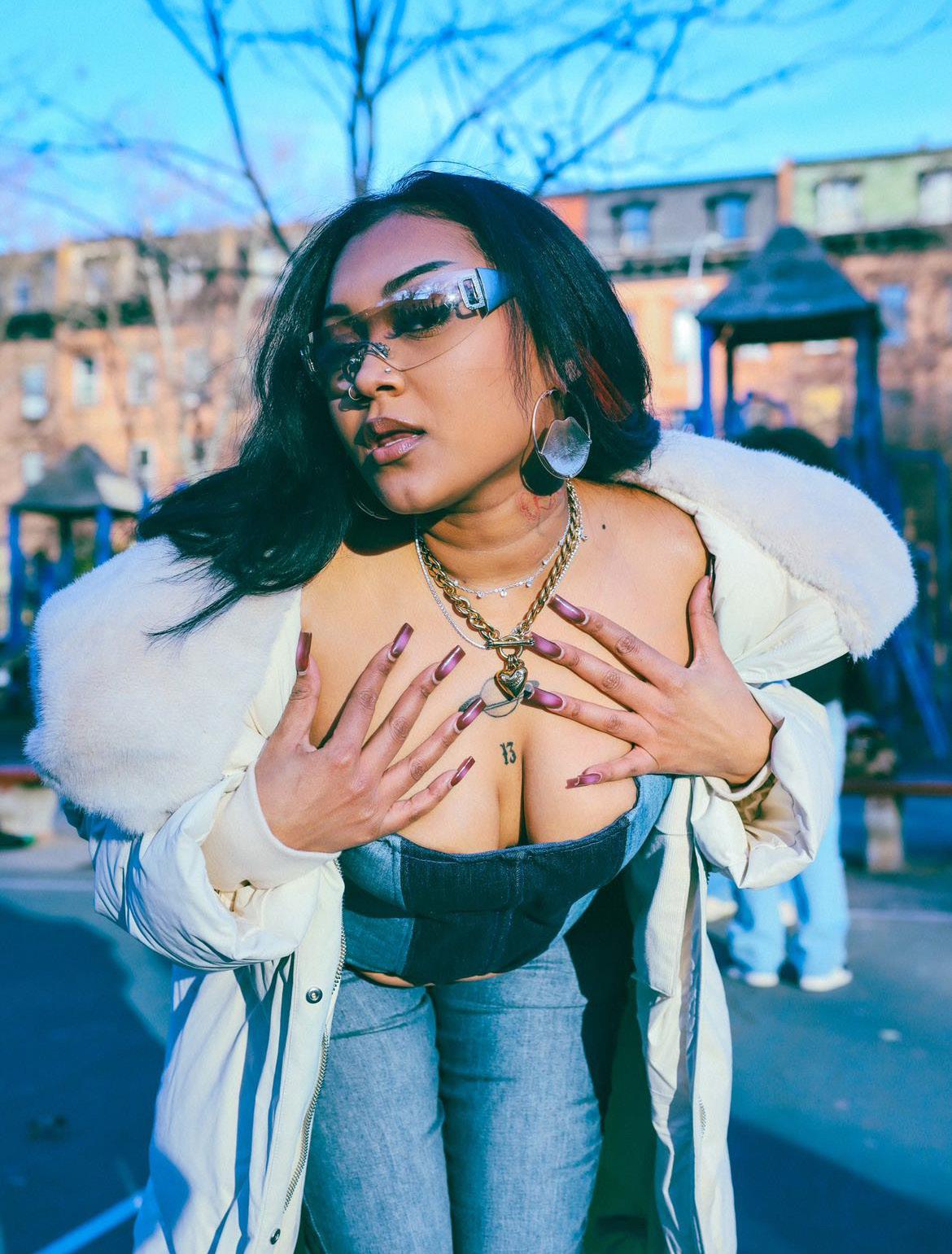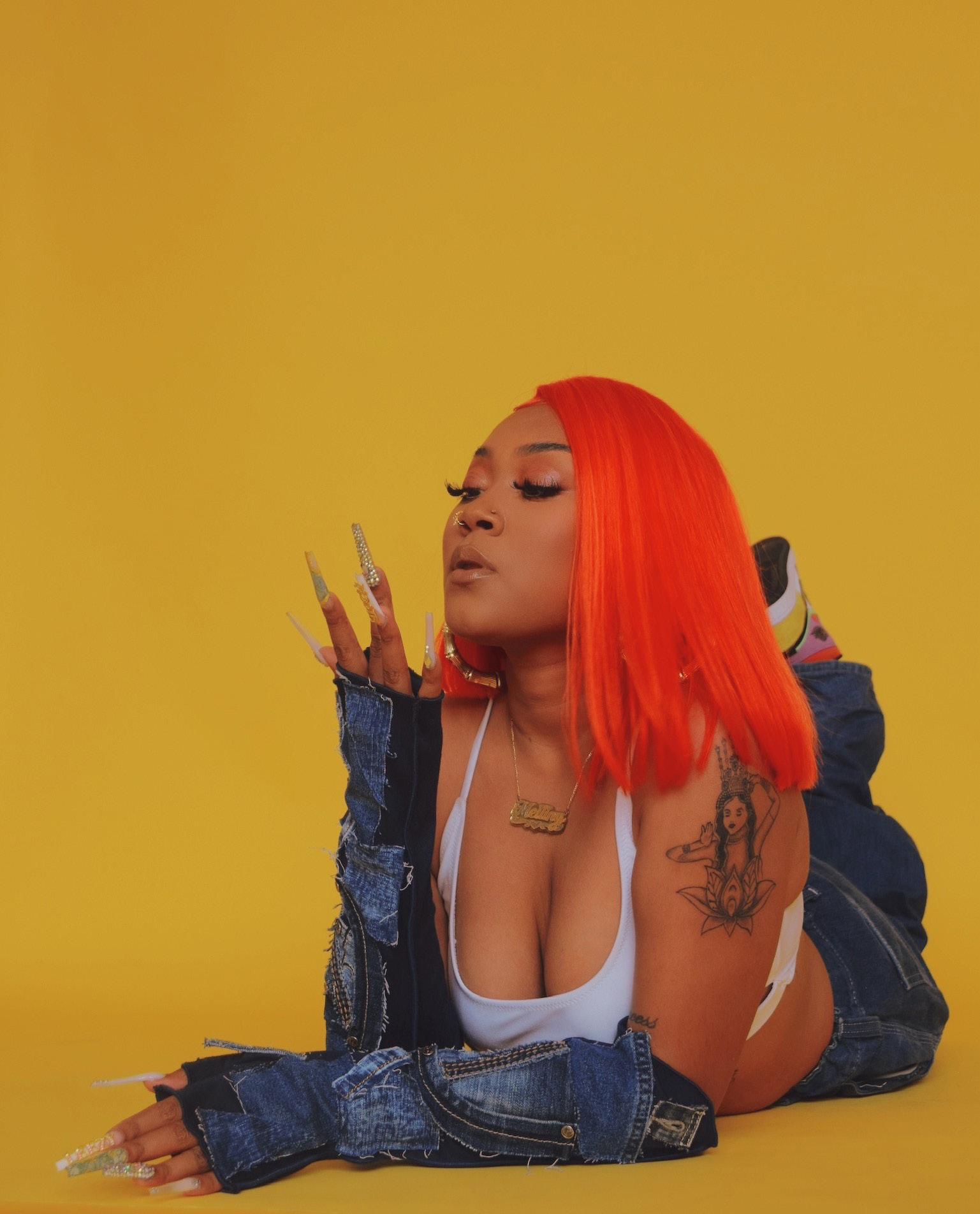
9 minute read
Khmeii
The buzzing upcoming artist Khmeii has f lled the eardrums of her audience across stages and everyday listeners. The groundbreaking artist shares her story, her early beginnings, and her motivations with Amani Kojo.
A. Kojo: Let’s start by discussing your f rst connection with Music.
Advertisement
K: My f rst assembly in school, we sang this song called ‘You Can Get It If You Really Want.’ I forgot who it was by, but oh my god, I loved it! They had us doing choreography to the song, like shaking our hips. I always followed directions; the other kids didn’t want to sing or couldn’t pick up on the steps. It was so much fun for me, and I took it seriously. You would have thought this was my life’s mission. I just loved performing, and I remember at the end of the assembly, all the parents kept coming up to my mom saying, ‘Oh my god, is that your daughter?’ It just felt good, and from then on, I knew I wanted to be a singer; I wanted to be a performer
A. Kojo: When did you start making music?
K: I started writing music in the second grade—honestly, that’s my earliest memory. I had very intense crushes, and every now and then, I would journal, writing songs about them, just for myself. I would imagine I was in a music video, envisioning scenes with my crush in vivid detail. It’s ridiculous; I’m in the second grade, talking about ‘You love that girl, you don’t love me, I’m reliable... I’m the one that you need.’ What do I know about that? But, you know, I think when you feel emotions deeply, you just have to get them out somehow. And for me, that way was through music, and clearly, it started early in life. Honestly, that’s the f rst thing I ever wanted to do, and it’s still like that to this day.
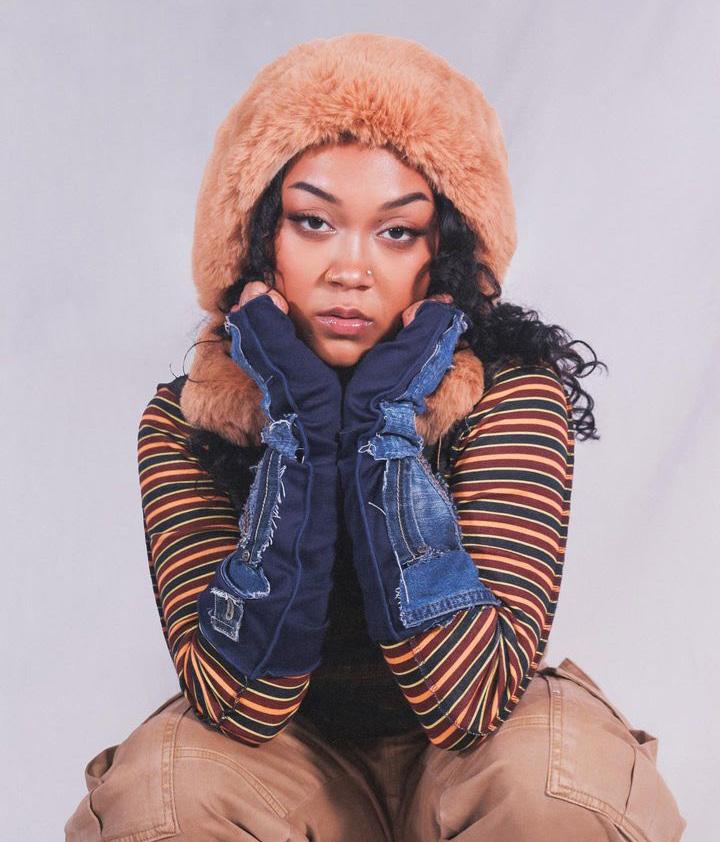
A. Kojo: Second grade? You’ve been writing for such a long time. You had a pen in second grade. That’s like a whole different level of fows and lyricism, and thought patterns.
K: I never thought of it that way, but yeah…
A.Kojo: I feel like writing music is a very vulnerable art. What gave you the conf dence to say I’m gonna start putting myself out there ?
K: Honestly, during the pandemic, I started putting out my music. I’ve been writing forever; I still have a lot of songs from middle school. They were all written on loose leaf in a binder, tucked away in a box somewhere in my room. At that age, you’re young and broke. I didn’t have any resources, and my parents weren’t like, ‘Oh yeah, let’s get you in the studio.’ I didn’t think that was an option, and I didn’t know how that worked. I would constantly think about American Idol and believe that was the way to get your music heard. So, I kept all my songs to myself because, at such a young age, with no resources and nowhere to put them, what was I going to do with them?
A. Kojo: Can you elaborate on your process before and during the pandemic?
K: You know, during the pandemic, there was a lot of time. I attended LaGuardia High School, and they had an elective for those who wrote and created their own music. It wasn’t a big elective. I auditioned for it twice and never got in. Moments like that are discouraging when you write your own music. It was like, ‘Damn, I’m not good enough for it yet.’ At the time, I probably wasn’t as conf dent as I am now, honestly. I always knew I wanted to put my music out; I just didn’t know how. Then, I got more familiar with people who were making music.
A. Kojo: How did the pandemic inf uence you to take that next step in your creative process?
K: During COVID, there was just so much time, so I was writing a lot more. I discovered a bunch of type beats on YouTube; I didn’t have any instrumentals; I wrote all these songs, but they had no background. So once I discovered type beats, and I started writing to type beats, I was like, okay this is a song… like I have a song now! I would record on GarageBand. That was my f rst time making music in 2020, and I put ‘em up on my soundcloud.
A. Kojo: How was the process of f nally sharing your music with people?
K: The f rst thing I ever put out was a f rst step. It was very vulnerable. I just had to get my feelings out, like it’s COVID—there’s nothing going on. How do I make use of this time? How do I make events for myself? How do I keep myself going when everything is stopping right now? I’m home, I can’t go outside, and there’s nothing to do. I can’t do everything that I wanted to do after high school. Shit, I didn’t have my graduation; I was gonna try training; I was gonna try to audition for different things, Broadway things, different small companies. I was gonna try to do all these things, and you can’t do those things anymore. That was ultimately when I was like, ‘All right, you know what? I could record something.
A.Kojo:Do you ever feel like you have to put on something to get past those moments of doubts?
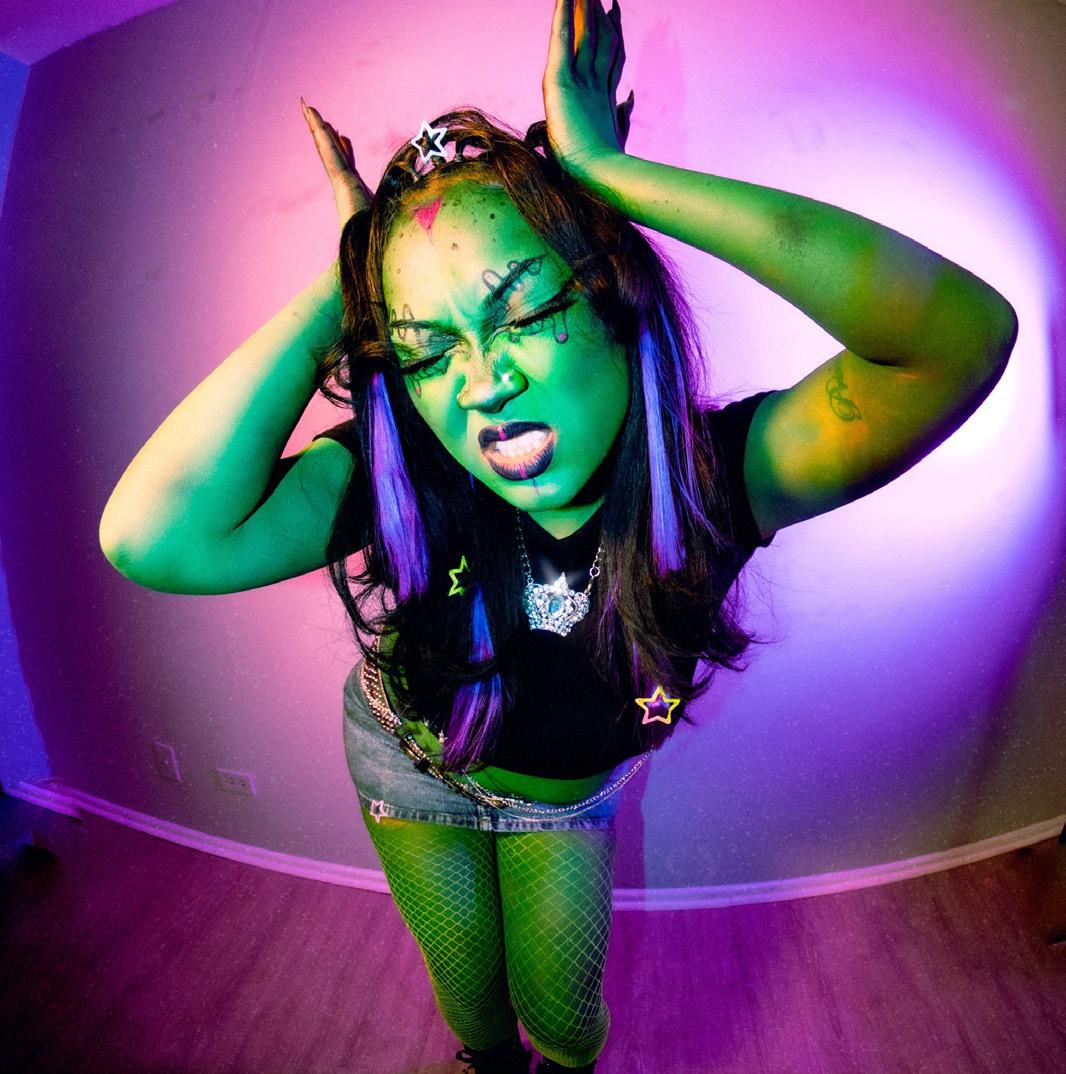
K: All the time, I’m not gonna lie. I feel like every time I need to get something done, I have to get it done, and it’s gonna get done. Honestly, it’s the passion. What else do I have to do? People live for a lot of different things, and you know, I’m still young; the things that I live for will change. Some may argue it’s not the healthiest thing to make it your life’s worth. But this is what I have—music is what I have. Music is what I want to do, so if I’m not doing music, I’m not doing anything. So if I need to get something done, it has to get done. I’ve felt like I wanted this for so long; I’ve been writing since second grade, and I know I wanted to be performing on stages, dancing, and jumping, so I haven’t let up on my dream yet.
A. Kojo: What advice do you wish you were given to help you along your path?
K: You do need to have a certain level of conf dence. You do have to, I would say, ‘fake it till you make it’—that’s been my motto since high school. People always come up to me and tell me, ‘Your stage presence, your conf dence,’ and I’m a very anxious person. I’m always concentrating or f xated on details and about what can go wrong. I like to have everything f gured out before I go into something, or I’ll panic. I’m somewhat of a perfectionist. As an artist, you are your biggest critic, your biggest supporter, and your biggest hater at the same time. At the end of the day, ‘you fake it till you make it’ because your feelings are not facts. It’s easy to kind of trip yourself into thinking like other people or, ‘Other people won’t like this,’ being unsure of yourself, and always doubting yourself. I always have to tell myself that just because I feel this way doesn’t mean it’s true. You know, there are people who are always gonna listen to what I have to say. There are people who do like my music, and they like it enough to listen to it again. They liked it enough to share with a friend; they liked it enough to repost it. So, I’m like, people support you; people are telling you that you’re good. So I go with it. At the end of the day, it doesn’t matter how big you are; it doesn’t matter how small you are; everyone, at some point, feels insecure
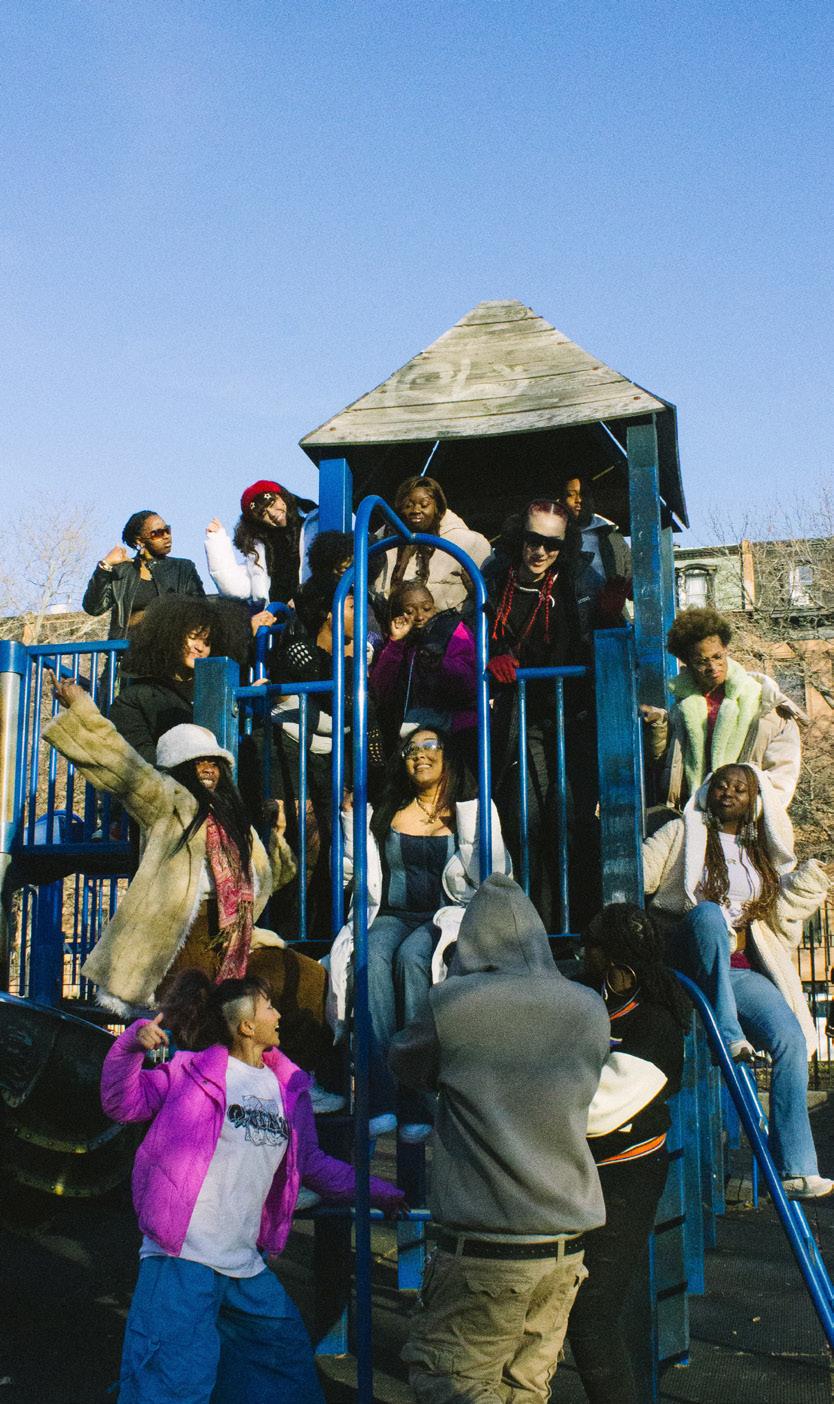
A. Kojo: I would like for you to talk a little more about ALTER EGO. I think it’s a tool of manifestation. I think it’s a certain level of disbelief someone must have however it’s fragile. What I mean by ALTER EGO is that you’re altering your perception of self to put onto the world so the world can perceive you differently because if they perceive you differently, life will put you at the status that you believe yourself to be in.
K: I agree with what you said. ALTER EGOs are used as tools of manifestation because, in reality, it’s not necessary to pretend to be somebody else to get to where you want to be. However, you def nitely have to put on a bit of gear, you know, before presenting yourself outwardly. I try. I def nitely think there is a little bit of an ALTER EGO there for sure. I like to think of my ALTER EGO as a lovely young lady named Ling Leezy. She is me. That was my f rst stage name when I was in sixth grade, and I wrote a rap about this girl. It was a diss track, very Disney. Disney raised me, so I’ll be having my little boss main character moments. I like to think that Ling Leezy sees me on a daily basis, and to be real; sometimes it’s just hard to be. Sometimes, you are your ALTER EGO naturally, but sometimes, it comes out in front of a big crowd or new people. Especially when I’m rapping, I feel like I’m still channeling sixth-grade big-headed Ling Leezy because she wrote some Disney Channel verse about this girl, but she owned that moment. I channel her all the time. She’s not necessarily something I switch into; she’s just always peeping over my shoulder. Like, ‘Is it my time?’ But you’re right. It is used as a tool in manifestation, ultimately.
A. Kojo: How would you say your ALTER EGO differs from what people expect you to be?
I feel like a lot of us are raised and expected to be humble. I’m not buying into the idea that we’re ‘supposed to be humble’ about this and that. When you do something good, you’re supposed to tone it down, and I’m not about that. If I think it’s the best thing since sliced bread, I’m gonna say that. If I feel like it could have been better, I’m gonna say that. Be a diva. Put your ALTER EGO on. Be a little sassy. Even if it’s not normally like you, I’ll def nitely get up on stage and put on my little sweet voice. I have a couple of things that I like to do with the audience—things that never fail. I can talk to you; I can see the expressions on your face; you can see the expressions on my face. I can do little things that make you feel it’s a personalized performance. At the end of the day, I keep going back to the manifestation part of it. Even on the days when I don’t feel like I’m doing what I’m supposed to do or when I feel like I’m not where I need to be, you still have to pretend like you are. No one else has to believe it more than you, honestly. Even if it requires a little bit of delusion, as they like to say. I don’t think it’s a delusion because, overall, I feel like I’m a really good artist. You know, I’m proud of the art that I make, and I’m very blessed to be a vessel of art where I can make music and put it out into the world. I’m very blessed that people listen to my music and are receptive to what I have to say. But you know, some days I don’t feel like that.
A. Kojo: What message would you like to leave the readers and your audience, as it pertains to your art, this interview and ALTER EGO?
K: I believe hell is a state of mind, and on this earth, you’re probably always going to be your biggest critic. Oftentimes, we restrict ourselves from doing the things we really love due to the fear of not being accepted, the fear of not being perceived correctly, or the fear of not receiving a positive response to whatever we’re doing. Many of us are just scared, and that fear can drive people to do crazy things. There are a lot of people who are afraid to live in their truth, whether it’s about dressing a certain way, presenting their gender identity, expressing their sexuality, or having different ideas. Many people don’t do what they want to do out of some sort of fear, and that’s like the worst state to live in. You’re not going to be happy if you’re constantly trying to appease others, if you’re constantly trying to make everyone else happy if you’re constantly trying to keep the peace. Ultimately, you’re the only one who has to live in your body with your brain. So, when people listen to my music, I just want them to be free. Do what you want to do. That’s my message. Do what you want to do. I feel like people need to give less of a fuck.
